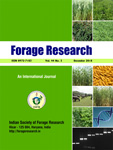EFFECT OF ORGANIC FARMING ON DRY FODDER YIELD, GRAIN YIELD, NET RETURNS AND SOIL FERTILITY IN MUNG BEAN-WHEAT (TALL) PRODUCTION SYSTEM
PAWAN KUMAR, MANOJ KUMAR SHARMA, S. K. YADAV AND R.K. NANWAL
Department of Agronomy
CCS Haryana Agricultural University, Hisar-125004 (Haryana), India
SUMMARY
A field experiment was conducted during the year 2005-06 and 2006-07, at research farm of CCS Haryana Agricultural University, Hisar to study the effect of organic farming on dry fodder yield, grain yield, net returns and soil fertility in mung bean-wheat (tall) cropping system. The results indicated that application of 1/3 N each applied in form of FYM + vermicompost + neemcake + NP bio fertilizers recorded highest dry fodder yield (5646 and 4738 kg/ha for mung bean and wheat), mean wheat equivalent yield (3294 kg/ha), net return (Rs.13391 & Rs. 21545/ha), B:C (2.39 & 2.44) and profit (Rs. 98.03 and Rs. 122.63/ha/day) as compared to other organic sources of nutrients during both the years of study. Application of 100 per recommended fertilizer dose (RDF) performed better among all the treatments. Soil fertility parameters i.e. Organic carbon, available nitrogen and available potassium was better after the harvest of mung bean crop than after the harvest of wheat tall crop.
Key words: Cropping system, economics, organic and inorganic sources

